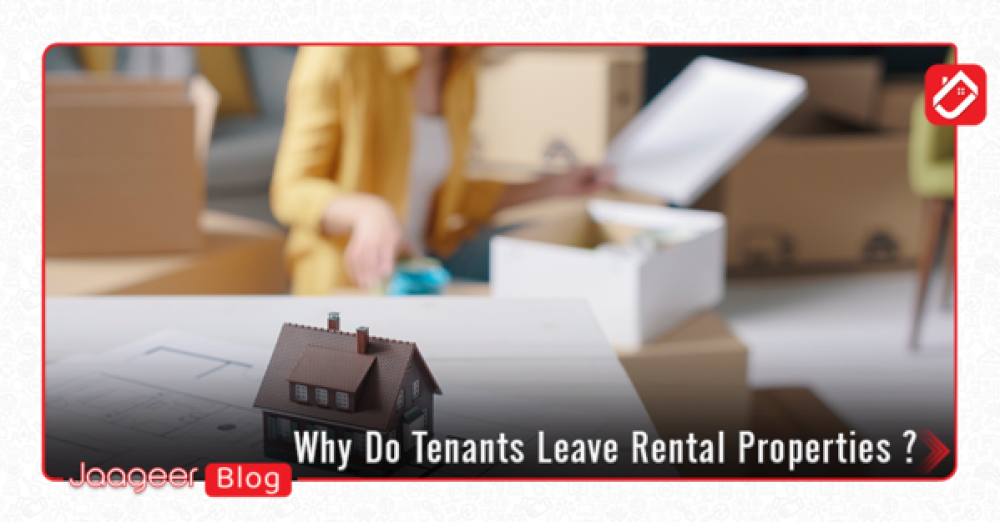Why Do Tenants Leave Rental Properties?
Most rental agreements are made initially for one year, with the possibility of further extensions. However, there are instances where renters vacate a property even before the one-year initial contract is up. The tenant's abrupt move may leave you as the landlord of a rental property at a loss. Although a landlord can't always persuade tenants to alter their minds, they can take the initiative to make things easier for their tenants and prevent vacancies. You must be aware of the most typical explanations for evictions to do this. Let's start...
HIGH RENT
.jpg)
Your tenants might find the house too pricey to rent if the rent keeps rising with each contract renewal. They might no longer be able to afford the same rental property due to a change in employment status or the arrival of a new family member. If your renter decides to save extra money for an impending expense or receives a medical diagnosis that is putting a strain on their monthly budget, their monthly expenses may also vary.
If your tenants have a positive history with you, you should make every effort to keep them as tenants in all of these situations. If you have numerous rental properties, you might be able to give them a cheaper alternative or try lowering the rent. By doing this, you would be able to keep your current tenant and just have one vacant spot to fill as opposed to two.
THE REQUIREMENT FOR MORE SPACE
A variety of life events necessitate the need for greater room. Marriage, the birth of a kid, the commencement of a home business, relatives moving in full-time, and other similar events can drive your tenant to begin looking for a larger unit. If you have larger properties available, do not be afraid to pitch them to your departing renter if they have a strong track record with you. The same regulation applies if your tenant is downsizing and needs to relocate to a smaller apartment because their children have relocated abroad or to another city.
.jpg)
A CHANGE IN THE SITUATION
If you're wondering why tenants leave their rentals, one explanation could be a change in their circumstances. While this may include a change in career or marriage, other adjustments may include an impending relocation owing to work, a divorce, or a separation. As a landlord, there isn't much you can do in this situation, but don't forget to provide them with a good referral so they can quickly locate a new rental property.
THE LACK OF PERIODICAL MAINTENANCE
All rental properties must be maintained and repaired regularly. Failure to do so may result in the loss of your tenant. When we talk about rental unit maintenance, we mean fixing blocked drains, leaking roofs, and broken windows and dealing with any bug issues. As a property owner, you must commit to and follow a timeline for repairs. Communication about potential delays is also essential if you want to keep your tenants longer.
THE PROBLEM OF LOUD NEIGHBOURHOODS
Noisy and threatening neighbours can deter good tenants. You cannot control who lives next door as a property owner, but as a landlord, you can control who rents your units. Make certain that all of your tenants have been thoroughly screened. Ask all possible tenants important questions, and only rent a property if the responses are suitable. This will assist you in weeding out noisy, unruly, or unpleasant renters while also retaining decent tenants in your property.
THE FEAR OF THE UNPREDICTABLE
Tenants begin to fear unexpected changes such as new neighbours, increased rent, longer load-shedding hours, impending developments in the neighbourhood, rising crime rates in a specific sector, and so on when there is a breakdown in communication between tenants and property owners. There is very little a rental property owner can control in their home's surroundings, but by staying in touch with your tenants, you can guarantee that you and they are on the same page when it comes to the things you can manage. This will build a trusting relationship between you and your renters, resulting in long-term tenants.
THE DREAM OF OWNING
.jpg)
Most of us dream of one day owning our own house, and if your tenants have been able to save enough money over the years, you should wish them the best of success. Furthermore, inform them that you will be seeking tenants for the property they are leaving and that they should offer you credible referrals of suitable tenants.
THE LANDLORD'S ATTITUDE
Tenants prefer to rent a house or flat from a cooperative owner who is flexible and understanding about rent payments and unexpected expenses. While being too tolerant can cost you money, having a positive connection with your tenants is vital. Be kind, listen to them when they have complaints about the unit or the neighbours, and try to resolve their difficulties as soon as possible. Your participation can help you keep your tenants.
These are some of the most typical reasons why renters vacate a rental property before the end of their lease.
As a tenant, the message here is that some characteristics of a good landlord set them apart and can help a renter assess whether they are signing a rental agreement with a suitable rental property owner.
As a landlord, you should understand that there are a multitude of reasons why a tenant may terminate a tenancy agreement in the middle. However, many of these problems can be addressed proactively to keep tenants for a longer time. The objective is to build a healthy tenant-landlord relationship based on trust and communication.
For more information about the most common rental affairs read our Blog,
Who Should Pay for Rental Repairs: The Landlord or the Tenant?
Easy steps for renting out your house and preparing it for new tenants
Relocating from a Rental Home? Use this checklist to streamline the procedure.
Head over to @Jaageer Blog to read more of our informative pieces covering different aspects. You can also connect with us on our Facebook and Twitter accounts.
Jaageer.com

.jpg)







